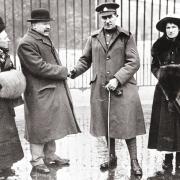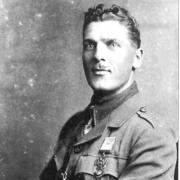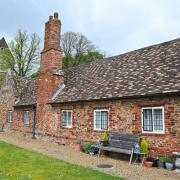Thirty odd years ago I lived, briefly, in the tiny hamlet of Sherbourne, near Warwick. My nearest pub was in the neighbouring village, Barford, and was named after a local hero, Joseph Arch, the founder and first president of what became the National Agricultural Labourer’s Union. He was born in the village in 1826. Arch was destined to sit in parliament for the constituency of North-West Norfolk.
I became aware of Arch’s story almost by accident. I was researching the extraordinary life of Frances, Countess Warwick, Edward VII’s ‘Darling Daisy’, who, having gone through both her own substantial fortune and a fair chunk of that of her husband, became a prominent socialist and a candidate for the Independent Labour Party. At one stage she persuaded Edward, whose mistress she was for a decade, while staying at Warwick Castle to visit neighbouring Barford to meet Arch. It was not a meeting, one suspects, that Edward much enjoyed, there would have been little common ground between the two men. It was reading of that meeting that put me on the trail of Joseph Arch, and what a fascinating tale it was.
I found out about the Norfolk connection when editing for publication the diaries of my Great Grandfather, for 38 years Vicar of East Dereham. Arch was a major irritant to him – his public meetings decimating congregations, his firebrand approach promoting a policy which Armstrong abhorred, his promotion of non-conformism anathema to a High Church priest. In fairness to my ancestor, he did at least go to listen to Arch, in April 1875, ‘haranguing a vast concourse of labouring men ‘. Describing Arch as ‘a thickset coarse sort of man’, whose ‘address was decidedly revolutionary’, he complained of the heat, and ‘the steam arising from so many with whom cleanliness is not always accounted next to godliness’. Great Grandfather was not an open-minded person, and rarely minced his words!

The more I read about Arch, the more I found myself at odds with the views of my ancestor. There is a great deal to admire in the way Arch built his platform for reform, even if – at the end – he proved to have if not feet of clay, then the odd toe of it.
His childhood was not untypical of the labouring classes of the age, although, very unusually, the family owned the cottage in which they lived, and in a large enough plot to grow vegetables to supplement their diet. His father was a shepherd, his mother had, ironically given the friendship between Arch and the Countess, been in domestic service at Warwick Castle. They were better off than many, but that is just a relative term. Life was very hard for the agricultural labouring class. In her foreword to Arch’s autobiography Daisy Warwick summed up their living conditions as ‘but little removed from that of the cattle they tend’.
Joseph was able to go the local school, although he had to leave at nine, to supplement the family income. In this he was more fortunate than many and was therefore literate. He benefited too from his mother’s determination to continue his education – the Bible and The Pilgrim’s Progress were the key texts.

Initially Joseph’s job was to scare crows, moving on to hedge-cutting at which he excelled. Indeed, his prowess in this discipline meant that he was able to enhance his income by travelling to undertake work both throughout the Midlands and in Wales. All the time he was continuing a course of self-education – literacy meant that, unusually for a man of his background, he developed an interest in politics and with it an affection for the Liberals. This led him to look to make contacts within the party – one he developed was with the editor of the Leamington Spa Courier a local paper with strong Liberal leanings. The paper’s support and the national press interest its coverage encouraged were to be of huge benefit to him later in his career.
Joseph’s mother, who had been a strong influence on him, died in 1845, but two years later he married Mary Mills, and they had seven children, which limited his travelling. At about the same time he became a Primitive Methodist, another significant influence on his thinking. And all the time he was developing his political awareness and connections.
He was becoming well known in his local area. The combination of education, political interest and travel made him a force to be reckoned with. Amongst the agricultural labourers he enjoyed a high reputation. He was ‘one of them’ but among their number he stood out for his education, political involvement, self-organisation, and his ability to argue a point. They may have shared his views, but they recognised that he was much more effective at articulating them and had the connections to make them more widely heard.

This regard was to become very clear in February 1872. He was invited to talk to a group of agricultural workers in the neighbouring village of Wellesbourne. The anticipated audience was about 30, and the meeting was to be held in a pub. It was a cold, wet night, but despite the conditions, and the lack of transport, more than 2,000 labourers attended, and the meeting had to be held outside with him speaking from under a chestnut tree. Overnight he found himself the champion of the local labourers, and news of his oratory spread rapidly. About three months later a local labourer’s union, founded after his talk at Wellesbourne, was subsumed within a newly formed National Agricultural Labourers’ Union, with Joseph as its first president.
Perhaps as a result of the column inches in the local paper, the nationals became interested in Arch and his union, and membership spread rapidly - within two years it had reached something in the order of 90,000, and public awareness of the appalling conditions and paltry pay suffered by the agricultural workers had greatly increased.
He began to travel especially in East Anglia, where he achieved success in raising wages by involving the union in local disputes, but he also developed a public persona, making major speeches in London, his oratory commanding the attention of a wider audience. The extent of his achievement is apparent in an article in The Spectator in December 1872 under the punning title ‘The Arch-Agitators’ following one of his speeches told of his ‘great acuteness and force of purpose’ and lauded his good humour and moderation. This seems to sound a positive note, but the correspondent was also guilty of some condescension, lightly mocking his grammatical errors, and his dropped ‘h’s.

1872 had been quite a year, from a rainy Wellesbourne in February to a major speech in London in just 10 months, and the following year he was invited by the Canadian government to visit and report on the suitability of the country for emigrating labourers. Emigration was, Arch believed, a good option for those of his members for whom he could not negotiate better terms and conditions -the union assisted in the emigration of an estimated 40,000 labourers both to Canada and Australia.
But Arch’s success was not to last very long. The year after his trip to Canada the union faced a huge challenge when East Anglian farmers formed their own ‘defence league’. This group instructed their members to sack all union members, and within a few months some 5,000 unionists had lost their jobs. The union was financially broken by the costs of the resulting strike. Unable to finance strike pay, Arch told his members to return to work. Resenting this volte face many members left the union and by 1880 membership had fallen to about 20,000, just as the agricultural depression took hold.
Joseph Arch was by this time becoming increasingly involved in national politics and as the union started to unravel stood unsuccessfully for election in a Wiltshire constituency. Five years later he was successful when he stood as Liberal candidate in North-West Norfolk, though his first stay in parliament was brief, beaten by just 20 votes a year later. He stayed loyal to the constituency – Norfolk had, after all, been an area in which he had enjoyed great success when building the union, and he was returned by a substantial majority in 1885.

Sadly, by this time he was not held in the same regard by those who had once lauded him. Many agricultural workers felt let down by his failure to continue to fight for their security when the farmers presented a united front. His election as a Liberal MP was not seen as being as relevant to their plight as his confrontations with the employers. His erstwhile supporters coming up with the verse:
Joseph Arch, he stole a march,
Upon a spotted cow,
He scampered off to Parliament,
But where is Joseph now?
They felt he had let them down – he appeared detached from their issues and his style of speaking was less effective in parliament, where he achieved little other than the acquisition of a degree of self-importance and a pompous manner.

These traits were most evident in his autobiography, edited by Daisy Warwick, which attracted an acerbic – and very lengthy – review in The Spectator, ‘Mr Arch’s recollections cannot always be implicitly trusted’ the reviewer wrote, wishing it ‘were more an autobiography and less a polemic against his adversaries’.
In retirement he retreated to his childhood home. His wife having died, he re-married in the Anglican church, having ceased to be a Methodist. He died in 1919, described by The Times in later life as ‘exceedingly feeble and aged’.
But he is best remembered as a man of strong views who managed to organise labour in a way that had not been seen before, as a result of his beliefs, his oratory and his commitment. Even though in his later years he became bitter and disengaged from the crusade he had sparked, he remains an icon of the left. In 2023 The Morning Star reported that the annual rally to commemorate the Burston School strike, ‘the longest strike in history’ would be followed by a Joseph Arch Walk.



























